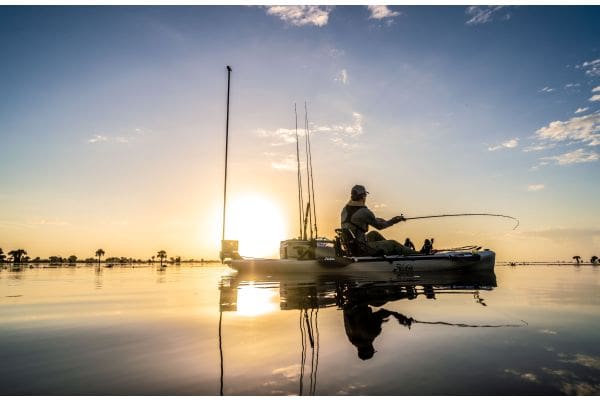Best Rods on Earth Day… and Every Day

Along the picturesque and historic Flambeau River lies the small city of Park Falls, Wisconsin, population 2,410. Like many other sparsely settled communities dotting the north woods, Park Falls has its roots in the logging trades but, today, derives its economic viability largely from tourism – offering goods and services in support of the millions of individuals who travel to the region for its ample and varied outdoor-recreational opportunities.
Fishing is near the top of the list of these opportunities, so, it’s fitting that Park Falls is also the home of St. Croix Rod – handcrafters of the Best Rods on Earth for the past 75 years.
“St. Croix exists to give anglers what we call the upper hand, which is a better and more-rewarding experience on the water doing what they love,” says St. Croix Vice President of Operations, Jason Brunner, a 27-year employee of the family-owned, American company. “That promise to anglers certainly means delivering performance and reliability, but to those of us here at St. Croix, it also means doing it in responsible ways that align with one of the most foundational aspects of recreational fishing, and that’s environmental stewardship.”
To Brunner’s point, our North American fisheries research, conservation, and management has been almost entirely funded by recreational anglers for most of the past century. Self-imposed excise taxes on fishing gear along with fishing-license fees provide the lion’s share of this revenue stream, but many individual anglers, fishing organizations, and fishing companies themselves establish their own projects and programs designed to further the health and wealth of natural resources upon which recreational angling depends.
“Just as we’re looking every day to identify new materials, technologies, and processes that improve the quality and performance of our fishing products, we’re constantly looking at ways to reduce our ecological footprint,” says Brunner. “From simple things like eliminating Styrofoam coffee cups to more involved initiatives like changing the way we paint our rods, we’re keeping our promise to anglers by increasing the quality of their fishing experiences while reducing environmental impacts.”
Biodegradable Rod Bags and Packing Materials
St. Croix handcrafts hundreds of thousands of fishing rods every year, and all of those rods must be wrapped to protect them throughout distribution. Instead of traditional plastic, St. Croix uses poly bags (and cello-wrap packing material) made from natural and renewable resources like sugar cane, potato starch, and other biologically sourced polymers. These eco-friendly packing materials are both biodegradable and compostable.
Electrostatic Painting
The poly bags described above help to protect the beautiful and durable finish that goes onto every St. Croix rod, many of which are sprayed in a paint booth. Excess paint particles containing volatile organic compounds (VOCs) are collected by a vacuum system and then caught in filters which are disposed of and replaced. “A little over two years ago, we moved to an electrostatic paint process,” Brunner says. “By applying mild, opposing electronic charges to our paint and to the rod blanks being painted, we’ve been able to greatly increase our efficiency, meaning we’re using a lot less paint to begin with, and generating far fewer excess paint particles that must be disposed of.”
Reduced Scrap
Beyond paint, St. Croix uses a variety of raw materials to craft the Best Rods on Earth. By improving practices and procedures over the past two years, St. Croix has reduced its overall scrap – excess raw materials that are either discarded or recycled – by more than 20%. “That’s significant, and we’re looking for ways to increase that number,” Brunner says. “Our computer-operated precision pattern-cutting machines maximize the number of patterns that can be created from a single roll of carbon fiber pre-preg material and are just one example of how we are minimizing waste.”
Enhanced Recycling
In addition to reducing the amount of scrap and material waste throughout the factory, St. Croix has an aggressive recycling program. “We use a polypropylene tape product to wrap our rod blanks during the curing process,” says Brunner. “We have a partnership with a local Wisconsin company that collects and recycles these materials every two weeks or so.”
Acetone is another product which St. Croix recycles. “We use quite a bit of acetone in the factory,” Brunner says. “It’s essential to the cleaning and decontamination of our mandrels and our painting equipment. We invested in an in-house acetone recycler about five years ago, which has cut the amount of virgin acetone we need to purchase and use by about 50%.”
All in 75 Years’ Work
Just as St. Croix relies on anglers to purchase the Best Rods on Earth, anglers rely on St. Croix and other fishing manufacturers to do their parts to conserve and protect the natural resources upon which all recreational fishing depends. But that doesn’t automatically happen. In fact, due to continued economic globalization, it’s happening less and less.
“As an American company that’s been owned by the same family for the past 47 years and been making fishing rods in the same community for 75 years, we’ve learned to see and appreciate the bigger picture,” Brunner says. “That means being accountable to our anglers, to our community, to our industry, and to ourselves. We make our rods in our own factories with our own people; we sell them to our dealers; and our dealers sell them to our anglers. We put our name on every rod… we don’t have anyone or anything to hide behind. Our manufacturing model is based on controlling everything we can – including our environmental footprint – so we can continue to make premium fishing rods that increase our anglers’ control on the water.
About St. Croix Rod
Headquartered in Park Falls, Wisconsin, St. Croix has been proudly crafting the “Best Rods on Earth” for over 75 years. Combining state-of-the-art manufacturing processes with skilled craftsmanship, St. Croix is the only major producer to still build rods entirely from design through manufacturing. The company remains family-owned and operates duplicate manufacturing facilities in Park Falls and Fresnillo, Mexico. With popular trademarked series such as Legend®, Legend Xtreme®, Avid®, Premier®, Imperial®, Triumph® and Mojo, St. Croix is revered by all types of anglers from around the world.
The post Best Rods on Earth Day… and Every Day appeared first on HuntingLife.com.
